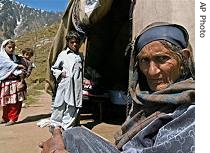2006年VOA标准英语-One Year Later, Pakistan's Earthquake Survivors
时间:2019-01-11 作者:英语课 分类:2006年VOA标准英语(十月)
By Benjamin Sand
Balakot, Pakistan
05 October 2006
A year after last October's massive South Asian earthquake, aid agencies are warning that nearly two-million people are facing a second Himalayan winter without proper shelter. VOA's Benjamin Sand revisits one of the communities hit hardest by the October 8, 2005 quake and files this report on the disaster's devastating 1 legacy 2.
----

Kashmiri earthquake survivor Kuresha, 73, sits outside her tent in Kalas Chungry
A song tells of the life and death of one of the quake's victims.
"When I died," the girl sings, "my body was broken and spread throughout the land. My family could not find me and I left without being buried."
The singer is 12-year-old Sundus Bibi. She performs the song for her classmates inside a makeshift school in Balakot, a small town in northern Pakistan. Her father was one of the 80,000 people killed in last year's earthquake.
Balakot, close to the quake's epicenter, was among the hardest hit villages.
At least 90 percent of the town's buildings were destroyed, including the school, where more than 50 children were buried alive.
Sundus's teacher, whose son died in the quake, says that even now many children are too frightened to come back to class.
She says even the younger children here know the earthquake's anniversary is approaching. She says many children in her class have stayed home this week because they fear another quake could destroy their school a second time.
Most survivors 4 here live in the same basic tents they erected 5 12 months ago and they say conditions are getting worse, not better. The camps are crowded, the tents leak, and fresh drinking water is hard to find.
International aid agency Oxfam says it is much the same story throughout the quake zone. The earthquake left more than three million people homeless. Oxfam's Kate Simpson says thousands are still living in tent camps like those in Balakot.
"In those camps where the 40,000 people live they have not had a lot of attention since last year, so the tents are run down and the facilities have not been maintained as well as they could have been," she said.
She says winter is now the greatest threat. Simpson says the freezing Himalayan weather could drive thousands of families that returned home earlier this year back into the already overcrowded camps.
In many areas, the snow has already started to fall. The government says it is rushing to provide improved shelter for the most vulnerable families.
Construction has begun on thousands of new homes throughout the region.
The government has promised about $1,200 to every family that lost property in the earthquake, and has distributed nearly $500 million for construction projects.
Nevertheless, Simpson says nearly two million people are living in temporary shelters and only about one in five families affected 6 by the earthquake has been able to start construction on permanent houses.
In Balakot, residents say it has been almost impossible to secure the promised government cash.
Mohammed Maskeen, 42, says people here feel let down. He says his house was destroyed. His sister and his nieces were killed. Throughout the past year, he says, government officials have surveyed the area and promised money. So far, he says, his pockets are empty and his family is still living in a tent.
Oxfam's Simpson says many of the quake survivors are also starved for information - how to apply for compensation, where to pick up the money and, critically, how to properly rebuild their homes.
"Because of the risk of future earthquakes that is one of the biggest issues. If people are rebuilding, they need information on how to rebuild safely," said Simpson.
The chairman of Pakistan's earthquake reconstruction 7 authority, Altaf Saleem, says much has been done, but complaints are inevitable 8 given the scale of the disaster.
"You know criticism will always be there when the magnitude of the problem is so much. We have to continue to do better, we believe that even the best can be improved," said Saleem.
The government says it expects everyone in the area to have basic winterized shelter before the end of December.
But full recovery will take longer. Local authorities say four years; international observers say it could be twice that long.
Balakot itself is not expected to survive. The government has declared the entire town a so-called "red-zone", because it sits on extremely unstable 9 terrain 10. Permanent reconstruction has been banned and officials want everyone to move into a new town being developed several kilometers away.
Just like the victim in Sundus's song, authorities here say the city is broken beyond repair . There is nothing, they say, anybody can do to fix it.
- It is the most devastating storm in 20 years.这是20年来破坏性最大的风暴。
- Affairs do have a devastating effect on marriages.婚外情确实会对婚姻造成毁灭性的影响。
- They are the most precious cultural legacy our forefathers left.它们是我们祖先留下来的最宝贵的文化遗产。
- He thinks the legacy is a gift from the Gods.他认为这笔遗产是天赐之物。
- The sole survivor of the crash was an infant.这次撞车的惟一幸存者是一个婴儿。
- There was only one survivor of the plane crash.这次飞机失事中只有一名幸存者。
- The survivors were adrift in a lifeboat for six days. 幸存者在救生艇上漂流了六天。
- survivors clinging to a raft 紧紧抓住救生筏的幸存者
- She showed an affected interest in our subject.她假装对我们的课题感到兴趣。
- His manners are affected.他的态度不自然。
- The country faces a huge task of national reconstruction following the war.战后,该国面临着重建家园的艰巨任务。
- In the period of reconstruction,technique decides everything.在重建时期,技术决定一切。
- Mary was wearing her inevitable large hat.玛丽戴着她总是戴的那顶大帽子。
- The defeat had inevitable consequences for British policy.战败对英国政策不可避免地产生了影响。
- This bookcase is too unstable to hold so many books.这书橱很不结实,装不了这么多书。
- The patient's condition was unstable.那患者的病情不稳定。